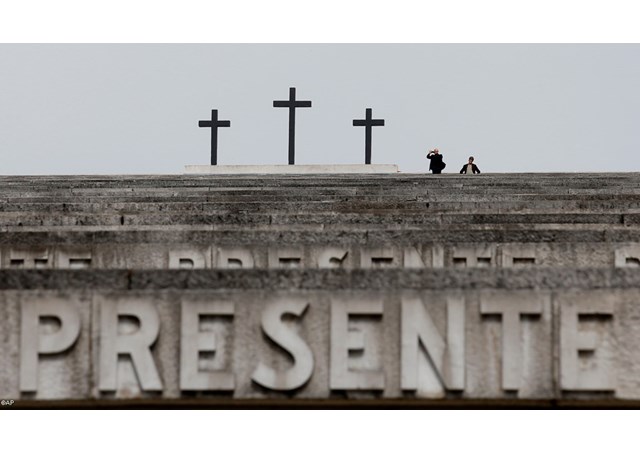
Pope Francis: War is "madness" which brings destruction

(Vatican Radio) Pope Francis on Saturday morning celebrated Mass at the Italian Military Memorial of Redipuglia. The visit to the area, which was the scene of fighting between Italy and the forces of the Central Powers during World War I, was to mark the centenary of the beginning of the war. The Mass was said for the fallen and victims of all wars.
Here lie many victims. Today, we remember them,” said Pope Francis, during his homily. “There are tears, there is sadness. From this place we remember all the victims of every war.”
During his remarks, Pope Francis called war “madness” and “irrational”, and said its only plan was to bring destruction.
“Greed, intolerance, the lust for power…. These motives underlie the decision to go to war, and they are too often justified by an ideology; but first there is a distorted passion or impulse,” said the Pope.
Below is the full text of the prepared homily of Pope Francis
Visit of His Holiness Pope Francis
to the Military Cemetery of Redipuglia
(13 September 2014)
After experiencing the beauty of travelling throughout this region, where men and women work and raise their families, where children play and the elderly dream… I now find myself here, in this place, able to say only one thing: War is madness.
Whereas God carries forward the work of creation, and we men and women are called to participate in his work, war destroys. It also ruins the most beautiful work of his hands: human beings. War ruins everything, even the bonds between brothers. War is irrational; its only plan is to bring destruction: it seeks to grow by destroying.
Greed, intolerance, the lust for power…. These motives underlie the decision to go to war, and they are too often justified by an ideology; but first there is a distorted passion or impulse. Ideology is presented as a justification and when there is no ideology, there is the response of Cain: “What does it matter to me? Am I my brother’s keeper?” (cf. Gen 4:9). War does not look directly at anyone, be they elderly, children, mothers, fathers…. “What does it matter to me?”
Above the entrance to this cemetery, there hangs in the air those ironic words of war, “What does it matter to me?” Each one of the dead buried here had their own plans, their own dreams… but their lives were cut short. Humanity said, “What does it matter to me?”
Even today, after the second failure of another world war, perhaps one can speak of a third war, one fought piecemeal, with crimes, massacres, destruction…
In all honesty, the front page of newspapers ought to carry the headline, “What does it matter to me?” Cain would say, “Am I my brother’s keeper?”
This attitude is the exact opposite of what Jesus asks of us in the Gospel. We have heard: he is in the least of his brothers; he, the King, the Judge of the world, he is the one who hungers, who thirsts, he is the stranger, the one who is sick, the prisoner… The one who cares for his brother or sister enters into the joy of the Lord; the one who does not do so, however, who by his omissions says, “What does it matter to me?”, remains excluded.
Here lie many victims. Today, we remember them. There are tears, there is sadness. From this place we remember all the victims of every war.
Today, too, the victims are many… How is this possible? It is so because in today’s world, behind the scenes, there are interests, geopolitical strategies, lust for money and power, and there is the manufacture and sale of arms, which seem to be so important!
And these plotters of terrorism, these schemers of conflicts, just like arms dealers, have engraved in their hearts, “What does it matter to me?”
It is the task of the wise to recognize errors, to feel pain, to repent, to beg for pardon and to cry.
With this “What does it matter to me?” in their hearts, the merchants of war perhaps have made a great deal of money, but their corrupted hearts have lost the capacity to cry. That “What does it matter to me?” prevents the tears. Cain did not cry. The shadow of Cain hangs over us today in this cemetery. It is seen here. It is seen from 1914 right up to our own time. It is seen even in the present.
With the heart of a son, a brother, a father, I ask each of you, indeed for all of us, to have a conversion of heart: to move on from “What does it matter to me?”, to tears: for each one of the fallen of this “senseless massacre”, for all the victims of the mindless wars, in every age. Humanity needs to weep, and this is the time to weep.
| All the contents on this site are copyrighted ©. |


